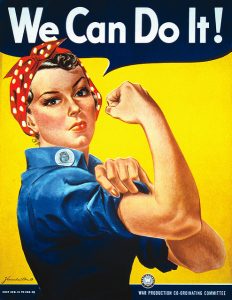
In the United States, one of the most recognizable cultural icons of WWII is Rosie the Riveter, an image that challenged traditional gender roles in American culture. Although this icon represents a critical moment in American women’s participation in the labor force, Jeffrey Hass finds that women in Eastern Europe did not use their entry into the labor force to challenge gender essentialism. Using diary entries written by women during the Blockade of Leningrad, as well as archival data and interviews with blockade survivors from the Museum of the Defense of Leningrad, Hass examines the roles of women in the Eastern front of WWII.
Hass finds that Eastern European women had to contend not only with changing perceptions of their dependency and status vis-à-vis men, but also the already embedded expectations of gender roles. Although narratives about patriotic responsibility encouraged women to perform duties like taking care of children and the home, women also described being pressured to recruit men into the Red Army and fill men’s jobs in the factories. Nonetheless, activities like bread seeking, caregiving, and factory work allowed women to construct a narrative of wartime heroism. But as these women became more aware of the importance of their skills, they started to view men as weak. And the more women viewed men as weak, the more they reinforced essential gender dispositions and relations.
Hass contends that the women of Leningrad did not feel empowered by taking on men’s roles because they challenged gender roles per se, but rather because these gendered practices gave them status and shifted the dependency relationship. He concludes that to better understand the relationship between changing gender roles and the reinforcement of gender’s essentialism during conflicts, it is necessary to analyze the objects and people that are permeated with sentiment and meanings.

Comments